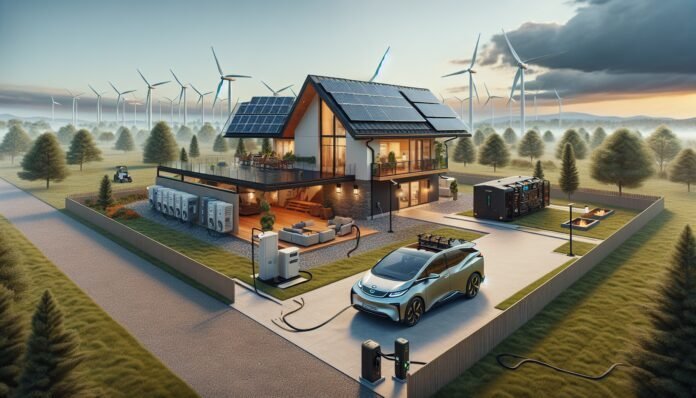Backup power solutions homes can rely on are essential, especially in disaster-prone areas where power outages are frequent and disruptive. Research shows that nearly 40% of homeowners experience extended blackouts annually, emphasizing the need for reliable backup systems. This post explores the best options for keeping homes powered during emergencies, from portable generators to whole-house battery systems. Choosing the right solution can safeguard your family’s comfort, safety, and daily routine when disaster strikes. Discover which power backup systems meet your specific needs and ensure you’re prepared for any eventuality.
Importance of Backup Power Solutions for Homes in Disaster-Prone Areas
Living in areas susceptible to natural disasters brings a unique set of challenges. One significant challenge is maintaining power during emergencies. Backup power solutions have become crucial for ensuring safety and comfort when the grid fails.
Why Reliable Backup Power Systems Are Essential During Emergencies
During emergencies, a reliable backup power system becomes a lifeline. It keeps essential appliances running, ensuring food preservation, communication, and medical equipment operation. With power outages, the risk of discomfort and danger increases, making backup power indispensable. Access to electricity during a crisis can significantly improve a family’s safety and well-being.
Common Causes of Power Outages in Disaster-Vulnerable Locations
Power outages in disaster-prone areas stem from various causes. Severe weather events like hurricanes, tornadoes, and floods often damage infrastructure. Earthquakes can also disrupt power lines and facilities. Additionally, wildfires pose a significant threat, destroying poles and transformers. Understanding these causes helps in preparing for unexpected outages.
The Hidden Costs of Prolonged Power Outages for Homeowners
Prolonged power outages carry hidden costs that homeowners often overlook. Food spoilage from non-functional refrigerators leads to financial loss. Lack of heating or cooling can damage property and increase repair costs. Moreover, power outages can result in lost productivity and income, further straining personal finances. Investing in backup power solutions helps mitigate these costs.
Types of Backup Power Solutions for Residential Use
There are various backup power solutions available for homeowners, each with distinct benefits and features. From portable generators to solar power systems, the right choice depends on individual needs and circumstances. Understanding these options helps homeowners make informed decisions about safeguarding their homes during power outages.
Portable Generators: Benefits, Features, and Key Considerations
Portable generators offer flexibility and convenience. They are ideal for short-term power needs and are easy to transport. Key features include fuel type, wattage, and portability. However, they require regular maintenance and fuel storage, which homeowners should consider when choosing this option. Despite these considerations, portable generators remain a popular choice for temporary power solutions.
Whole-House Generators for Comprehensive Power Coverage
Whole-house generators provide a more permanent solution. They automatically power your home during outages, offering seamless transition and comprehensive coverage. These generators connect to your home’s fuel supply, ensuring consistent operation. Installation and maintenance costs are higher, but the reliability and peace of mind they offer make them a worthwhile investment for many homeowners.
Solar Power with Battery Storage: Eco-Friendly Emergency Backup
Solar power systems with battery storage offer an eco-friendly backup solution. They harness solar energy, storing excess power for use during outages. Key benefits include reduced energy bills and a smaller carbon footprint. Solar systems require significant upfront investment but offer long-term savings and sustainability. They are an ideal choice for environmentally conscious homeowners.
Choosing the Best Backup Power Solutions for Your Home
Selecting the best backup power solution involves careful evaluation of various factors. Considerations include power needs, budget, and maintenance requirements. Understanding these aspects ensures that homeowners choose a solution that aligns with their lifestyle and disaster preparedness goals.
Factors to Consider When Evaluating Backup Power Needs
Assessing backup power needs starts with identifying essential appliances and systems. Consider the duration of typical outages and the specific power requirements of your home. Evaluate your budget and space for installation. These factors help narrow down the most suitable backup power solutions for your needs.
Comparing Costs and Maintenance of Backup Power Systems
Cost and maintenance are crucial considerations in choosing backup power systems. Portable generators may have lower upfront costs but require regular maintenance. Whole-house generators demand higher initial investment and installation costs but offer greater convenience. Solar power systems offer savings long-term but require significant initial expenditure. Evaluating these aspects helps in making an informed decision.
Top Brands and Models of Backup Power Solutions in 2023
The market offers a range of reliable backup power solutions. Leading brands in 2023 include Generac, Honda, and Tesla. Each brand offers various models catering to different needs and budgets. Evaluating top models ensures homeowners invest in reliable and efficient systems, providing peace of mind during emergencies.
Conclusion
Backup power solutions are crucial for maintaining safety and comfort during power outages in disaster-prone areas. Common causes of outages include severe weather, earthquakes, and wildfires, which disrupt power infrastructure. Homeowners can choose between portable generators, whole-house generators, and solar power systems, each offering unique benefits and drawbacks. Factors like power needs, budget, and maintenance requirements should guide decisions on the best backup solution. Leading brands like Generac, Honda, and Tesla offer reliable options for ensuring uninterrupted power during emergencies.
FAQ
What are the best backup power solutions for homes during power outages?
Top choices include standby generators, portable generators, and solar-powered systems. Standby generators automatically start during outages, offering seamless power transition. Portable generators provide flexibility but require manual setup. Solar-powered systems harness renewable energy, suited for eco-conscious homeowners.
How do I choose the right home backup generator for my energy needs?
Identify critical appliances and total wattage requirements. Consider generator size, fuel type (natural gas, propane, diesel), and automatic transfer switch compatibility. Consult with a professional to match generator capabilities with your energy demands and budget.
Are solar-powered backup systems reliable for residential use?
Solar-powered systems offer reliability, especially with battery storage. These systems reduce dependence on fossil fuels and lower electricity bills. Consider weather conditions and solar panel efficiency when evaluating reliability for your location.
What is the difference between whole-house generators and portable backup power options?
Whole-house generators connect directly to home circuitry, providing continuous power during outages. They operate automatically, ensuring convenience. Portable generators offer mobility and cost less but require manual operation and connection to appliances.
How much does it cost to install a home backup power system?
Installation costs vary based on system type and capacity. Standby generators range from $2,000 to $15,000, including installation. Portable generators cost significantly less, starting around $500. Solar backup systems typically range from $10,000 to $30,000, depending on size and battery storage.
How can I maintain and test my home’s backup power system for optimal performance?
Regular maintenance includes checking fuel levels, inspecting connections, and changing oil and filters. Test systems monthly to ensure functionality. Schedule professional inspections annually to address mechanical issues and ensure peak performance.

